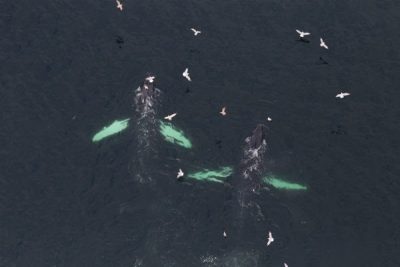This story has been updated.
The National Marine Fisheries Service has given its go-ahead for seismic surveys for oil and natural gas in the Atlantic, approving five companies for incidental harassment of marine mammals under the Marine Mammal Protection Act.
Supporter Spotlight

Seismic blasting cannot begin until the Bureau of Ocean Energy Management, or BOEM, issues its final permits.
The service’s Incidental Harassment Authorizations require monitoring, reporting and mitigation measures to reduce the harmful effects of survey activities on marine mammals. Observers are to be on board survey vessels to listen and watch for marine life and alert operators if a protected species comes within a certain distance.
Restrictions are to be placed on operations to eliminate or reduce impacts to sensitive species in their preferred habitats. Acoustic monitoring to detect marine mammal vocalizations beneath the ocean surface will be required. Seismic operations are to be phased in gradually to alert animals in the area and reduce potential for exposure to intense noise. Shutdowns will be required when certain sensitive species or groups are observed.
The authorizations cover operations along the Atlantic Coast from Cape May, New Jersey, to Cape Canaveral, Florida.
In developing its requirements for the authorizations, National Marine Fisheries said it reviewed five separate applications from companies involved in geophysical surveys using airgun arrays in the Atlantic Ocean and listened to public feedback on both the applications and proposed authorizations.
Supporter Spotlight
The five companies are CGG, ION GeoVentures, Spectrum GEO Inc., TGS-NOPEC Geophysical Co. and WesternGeco.
In a conference call with reporters Friday, Donna Wieting, director of the National Oceanic and Atmospheric Administration’s Fisheries Office of Protected Resources, said NOAA Fisheries had done “a very thorough job” in reviewing public comments and responding to them.
The authorizations are valid for one year after an approved company notifies NOAA Fisheries, as required, that they are set to begin surveys. The latest expiration date for authorizations is Nov. 30, 2020.
Environmental advocates noted Friday that BOEM had previously denied permits based on the risks to marine life outweighing the value of any information to be gleaned from the surveys.
“This action flies in the face of massive opposition to offshore drilling and exploration from over 90 percent of coastal municipalities in the proposed blast zone,” said Diane Hoskins, campaign director at the group Oceana. “These permits were already denied because of the known harm that seismic airgun blasting causes. President Trump is essentially giving these companies permission to harass, harm and possibly even kill marine life, including the critically endangered North Atlantic right whale – all in the pursuit of dirty and dangerous offshore oil. This is the first step toward offshore drilling in the Atlantic and we’re going to make sure coastal communities know what’s happening and fight this.”
Oceana announced it had launched an interactive “We’re Watching” map to track seismic vessels in near real-time off the East Coast.
Also, the Business Alliance for Protecting the Atlantic Coast, which represents more than 42,000 businesses and 500,000 commercial fishing families from Maine to Florida, condemned the action.
“The Outer Banks business community depends on a clean and beautiful coast to support our multi-billion-dollar tourism, recreation and fishing industries,” said Karen Brown, president and CEO of the Outer Banks Chamber of Commerce and also a member of the alliance. “The release of these permits puts us one step closer to oil-covered beaches and economic disaster.”







